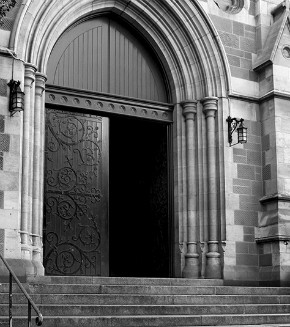What the church is made of

Frederick Buechner has been my companion and mentor over the years without even knowing it. I’ve learned a lot from him and have thoroughly enjoyed reading his graceful, descriptive, and imaginative writing. I suspect that I’ve read almost everything he wrote, and I continue to pull his books from the shelf: The Sacred Journey, The Magnificent Defeat, and The Clown in the Belfry: Writings on Faith and Fiction.
Buechner is an ordained minister in the Presbyterian Church (U.S.A.), but as far as I know he doesn’t pay much attention to denominational affairs. Yet when he writes about church I listen. In a chapter in Secrets in the Dark titled “The Church” he writes, “Jesus made his church out of human beings with more or less the same mixture in them of cowardice and guts, intelligence and stupidity, of selfishness and generosity, of openness of heart and sheer cussedness as you would be apt to find in any one of us. The reason he made his church out of human beings is that human beings were all there was to make it out of. In fact, as far as I know, human beings are all there is to make it out of still. It’s a point worth remembering.” In my own experience of the church, I was grateful for the reminder many times.
Two sentences at the end of his essay pop into my mind every time I hear that the nones are the only religious category that’s growing, that denominations are running out of money, or that another congregation is leaving its denomination over this or that issue. “Maybe the best thing that could happen to the church would be for some great tidal wave of history to wash it all away—the church buildings tumbling, the church money all lost, the church bulletins blowing through the air like dead leaves, the differences between preachers and congregations all lost too. Then all we would have left would be each other and Christ, which was all there was in the first place.”





